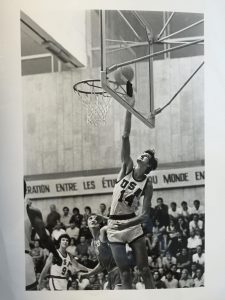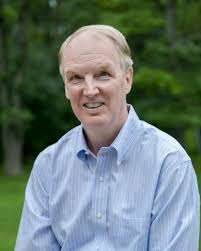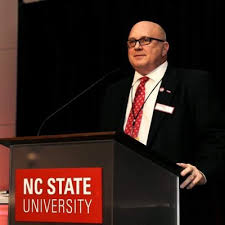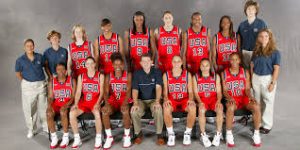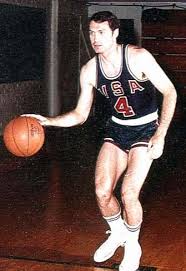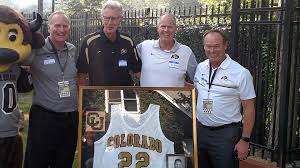The NBA Finals date back to 1947 (when they were known as the Basketball Association of America Finals) and the very 1st NCAA tourney was held in 1939. Olympic basketball competition is even older: it debuted as a demonstration event in 1904 and the men’s version became a medal sport in 1936, with the women finally getting their chance to go for the gold in 1976. The United States has dominated Olympic basketball competition from the start: the men have won 15 gold medals in the 18 tournaments they have participated in during the past 84 years, while the women have won 8 gold medals in the 10 tournaments in which they have competed during the past 44 years. Those of you who were looking forward to the 2020 Olympics opening ceremonies in Tokyo on July 24, 2020 will have to wait an extra 364 days, as the coronavirus caused a postponement until July 23, 2021. Due to the absence of college basketball since mid-March, HoopsHD’s Jon Teitel decided to fill the void by trying to interview as many prior Olympic players/coaches as possible so that you have something to read this summer while not watching the Summer Games. We continue our coverage by chatting with Van Chancellor about winning 4 straight WNBA titles from 1997-2000 and a gold medal in 2004. Today marks the 23rd anniversary of Van’s Houston Comets beating New York 65-51 to clinch the very 1st title in WNBA history.
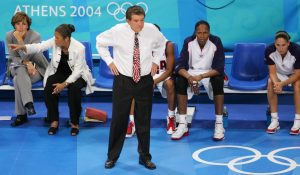 (photo credit: Tyler Wooten/Ole Miss)
(photo credit: Tyler Wooten/Ole Miss)
You graduated from Mississippi State in 1965 and later became the winningest coach in Ole Miss history with 439 victories: how did you get the head coaching job with the Rebels, and how big is the rivalry between the 2 schools? The rivalry is as big as it could humanly be. You cannot have a good Saturday if your team does not beat the other school. I was the 1st coach to ever graduate from Mississippi State and get a job with Mississippi but the shift in my loyalty was based on the receipt of my 1st paycheck.
In 1992 during your 1st practice after an OT win over defending national champ Tennessee you ran your team hard so hard that your daughter Renee injured her ankle: what did Renee say to you, and what did your wife say to you? My wife thought that I was a blooming idiot and my daughter thought that I was the worst coach in the SEC: I had 2 very unhappy women at home!
In Game 2 of the 1999 WNBA Finals you had a 2-PT lead with 2.4 seconds left: how were you able to bounce back to win the series after Teresa Weatherspoon made a 50-footer off the glass to clinch a 1-PT win by New York? I told Teresa for years that she gave me 2 sleepless nights. I did not know what to tell my team but was so happy when we won that series. I remember Cynthia Cooper coming up to me in the locker room and telling me not to worry because there was no WAY that we were going to lose Game 3.
You won 3 straight WNBA COY awards from 1997-1999 and your 1998 team set a record for highest winning percentage in NBA/WNBA (27-3): what made you such a great coach, and do you think that anyone will ever break your record? I did not think my coaching had 1 bit to do with winning those awards. My 3 best players helped me win it: Janeth Arcain/Cynthia Cooper/Tina Thompson. I think that every record will be broken, even Joe DiMaggio’s 56-game hitting streak. I do not care about the record: getting the rings is what excited me.
Despite having to store the team’s equipment in your apartment after 1st getting hired, you won 4 straight WNBA titles in your 1st 4 years as coach of the Houston Comets from 1997-2000: how were you able to be so dominant for such a long period of time? We struggled during certain parts of the season when egos got in the way but we would always get it worked out during the playoffs and come together for the good of the team to win another title.
You were 38-0 in international competition as head coach of the US Olympic team from 2002-2004 and won a gold medal at the 2004 Olympics: what did it mean to you to represent your country, and what did it mean to you to win a gold medal? For a country boy from Mississippi to be named coach of the Olympic team: I just cried. We went all over the world and I never had 1 problem with anyone. It was the greatest experience of my life and nothing could mean any more to me.
In 2001 you were inducted into the Women’s Basketball Hall of Fame and in 2007 you were inducted into the Naismith Hall of Fame: where do those rank among the highlights of your career? I was so honored to go into both of those Halls of Fame. Someone said that I was 1 of the 1st modern men to go into the Women’s Hall of Fame…but someone else corrected them and said there is nothing modern about me! I have to pinch myself every time I go to Springfield: it is hard to believe I am actually in it.
You made the 2008 Final 4 in your 1st year as coach at LSU and had a 1-PT loss to Tennessee in the lowest-scoring game in Final 4 history after Alexis Hornbuckle made a REB/put-back with 0.7 seconds left: where does that rank among the most devastating losses of your career? That ranks #1. It happened 12 years ago but I still think about it today. I thought that we had the game won and I had just told the team to not give up an offensive REB. Every player did everything that we wanted, but as time as passed it has gotten harder for me to get over.
What have you been up to since getting out of coaching? I try to play golf 5 days/week. I have got doing nothing down pat and spend a lot of my time following my grandkids in their own sports.
When people look back on your career, how do you want to be remembered the most? I really cared about my players and loved them as individuals. The wins/awards do not matter as much as whether I as able to make a difference in 1 player’s life.

